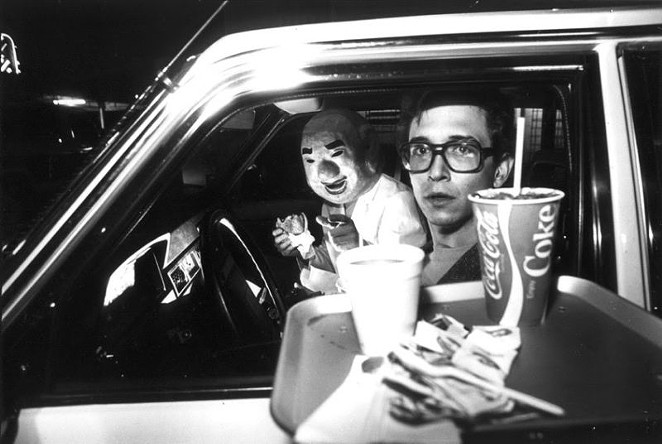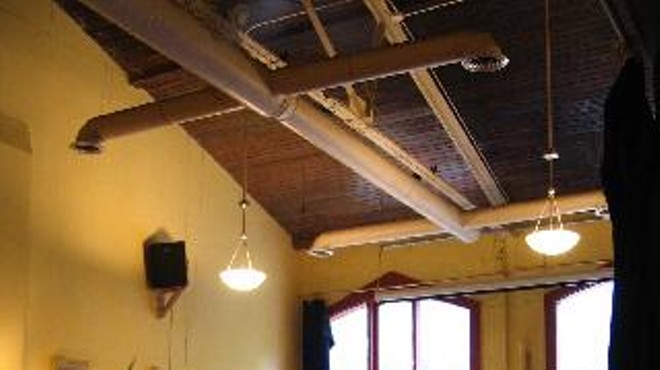BEFORE HIPSTERS were a thing and before Andre The Giant had a Posse, in the wake of the '60s-'70s underground counterculture — think R. Crumb — there was, and still is, Rev. J.R. "Bob" Dobbs and the Church of the SubGenius.
Part elaborate hoax, part social satire, part Andy Kaufman-level performance art, the Church of the SubGenius was the brainchild of Doug Smith, aka Reverend Ivan Stang, who began the movement in Dallas, Texas, in 1979.
Through an increasingly complex and hilarious shared mythology and debauched gatherings called “Devivals,” the Church of the SubGenius was a prototypical example of the concept of Culture Jamming — using a dominant culture’s own tropes against it as a form of satire and protest.
The church’s main “evangelical” message was the concept of Slack — think Zen for the rock ‘n’ roll generation.
Psychotronic Film Society brings what basically amounts to the world premiere of the buzzworthy new documentary, J.R. ‘Bob’ Dobbs and the Church of the SubGenius, to the Sentient Bean this Sunday night, with a wholly unique afterparty at Savoy Society on Liberty Street.
We spoke to Rev. Stang himself, as well as Director Sandy K. Boone, about the film.
How do you hope the new documentary affects not just perceptions of the origins and history of the Church of the SubGenius, but future perceptions of it, as American life parodies itself?
Stang: I sincerely hope that the movie gives as many people as possible the perception that they each need to send me $35 (plus postage) for a SubGenius Membership Ordainment Kit.
Boone: This is a film that will make you laugh out loud, but also, I am hoping, offer many “aha” moments for further reflection. It’s a prompt for folks to consider how others, especially those in positions of power, use cult tactics to separate and divide us with fear. I believe this film can help us all find a path to speak out about the absurdity of our current political situation, which in reality is far more absurd than the Church of the SubGenius was or ever had been! My desire was to make a film that both honors my late husband (an early member of the Church), and also allows others to see what I have known all along – that the SubGenius – these men and women that love to “yak about Slack” are some of the hardest-working, clever, creative, witty people you will ever meet!
How has the message of Slack translated to younger people, in this era of increasing impermanence of careers and a rapidly changing economy?
Stang: We were early getting on the Web, and started “podcasting” the Hour of Slack radio show before the word podcasting — or even the mp3 format — were invented. However, we didn’t modernize subgenius.com after about 2010 (got bored with it) and I personally didn’t mess with Facebook until about three years ago. So actually we haven’t been all that dutiful about brainwashing kids for “Bob” in the last few years. Luckily, they brainwash each other fairly well!
Boone: Well the great thing about Slack is that the Church never really defines it. “Slack,” by definition, is really different for each person. Some people like to work at what they enjoy. Some people really prefer to just sit and watch TV and vegetate. “The Conspiracy” is anything that takes away your Slack. I think even young people who have never heard of the Church of the SubGenius can relate to feelings of oppressiveness, instability, or anxiety over an uncertain career path or future.
How has the concept of Culture Jamming evolved in the social media era?
Boone: Culture Jamming has become infinitely more prevalent and rapid than when the SubGenius used similar tactics back in the early 80s. What was once a novelty is now commonplace. We can trace the path from the SubGenii’s early years – strangers writing letters and mailing cartoons and cassette tapes across the country, to the Internet age of Instant Messenger and chat rooms, to the present day social media barrage which is so integrated into our culture it’s practically inescapable. What could have once been labeled subversive or disruptive is now just a minor blip. You have to REALLY push yourself to think outside the box in order to make an impact.
It seems as if the American public has lost a vast amount of critical thinking skill, and the appreciation and recognition of satire seem to be quickly vanishing. How might this affect future activities of the Church?
Stang: I feel very strongly that the Internet, instead of improving education and spreading knowledge, encouraged people to live inside their own favorite “bubble,” and generally dumbed the populace down with disinformation. That would make it easier for people to misunderstand the Church and take it at face value — which would be TERRIBLE! If anything, we’ve deliberately tried to increase, for instance, our use of scientific terms and polysyllabic words in general. Indeed, JUST TO BE CONTRARY, I have basically stopped using coarse four letter words, instead replacing them with laughably old-fashioned curses like “Dad blame it,” “What in the Sam Hill?” etc. Whatever the Conspiracy is doing, such as reducing the written word to 100-character grunts and pictos, we’ll try to do the exact opposite. Hence (for instance) the deliberately old-school, black-and-white look of our web pages (at least the ones people see first).
Boone: That’s a key posit of the film that I’m hoping will help spark a conversation. I WANT audiences to be asking themselves – Is there still a place for the humor and comedy of “the Church” in today’s society of fake news and real life absurdity? Or do we need it now more than ever? How and when can a “joke” be taken too far, if at all? I would like the audience to enjoy the tongue-in-cheek humor and fun of the Church, but at the same time equip themselves to understand the serious consequences of group-think and employment of cult practices against us, in politics but also our personal lives. Others adopt and utilize these practices to divide and separate us by creating an “us and them” mentality – but only if we allow them to do so.
Many have said the rise of Donald Trump has laid bare the inherent hypocrisy of typical American evangelical Christianity. I might counter that basically all organized religions have inherent hypocrisies. Do you feel evangelical Christianity occupies a space of its own in terms of unreconciled paradoxes and general hypocrisy?
Stang: I don’t think Christianity holds any special records for ridiculousness; it’s just the one my English-speaking peers are most familiar with. We swiped hilariously convoluted and contrived notions from as many religious as we could, from Hinduism to The Flat Earth Society. I will say that it’s disturbing to see political tribes becoming more and more like especially cultish religious groups.
Boone: There are stereotypes in ALL faiths. When people say Christian or Evangelical - we are not all the same. Atheists, Buddhists, Christians, Muslims – each fall on a sliding scale of hypocrisy and beliefs within their chosen faith (or lack thereof). The hypocrisy is in the stereotypes when you judge based on the religion without knowing anything about the individual. This applies to the Church of the SubGenius as well. Yes, it’s easy to categorize the SubGenius all together, but the individual members are as eclectic as they come. As long as human beings exist, there will be hypocrisy in this world. It’s our job as individuals to find the truth in all stories and not fall into the propaganda of “fake news.”
































